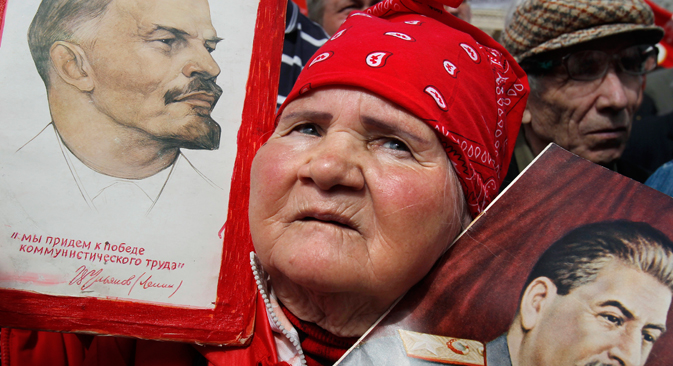
Experts are skeptical in their assessments of the communist party chances to come to power. Source: Reuters
The Communists who ruled Russia for more than 70 years are still the second most powerful political force in the country. They promise people Chinese-style socialism, yet their popularity and influence are diminishing. New communist parties arise preaching “true communism” and denouncing the corrupt old guard.
The Communist Party of the Russian Federation (CPRF) is generally acknowledged as the successor of the Communist Party of the Soviet Union (CPSU).
In the last elections for the State Duma, the CPRF officially received 11.57 percent of votes (elections were won by United Russia with 64.30 percent of votes). The Communist’s candidate for president, Gennady Zyuganov, also took second place after Vladimir Putin with over 12 million votes (nearly 17 percent of all votes cast) in 2012. The party is represented in 81 regional divisions and has 156,528 members.
Half of Russians remain positive about Stalin
About 60 percent of Russians see communism as good system - poll
Today the former ruling party reckons itself among opposition groups. The CPRF's stated goal is to establish socialism in Russia. Immediate goals of the CPRF include the nationalization of natural resources, agriculture and large industries within the framework of a mixed economy that allows for the growth of small and medium enterprises in the private sector.
However, not all people who share communist views agree with the policy of the CPRF. Year 2012 was marked by the creation of two alternative communist parties: the Communists of Russia and the Communist Party of Social Justice. The Communists of Russia first appeared in 2009, when it was registered as a public organization.
The main difference between the CPRF and the other two parties is an attitude towards religion: The CPRF shows a significant rapprochement with the Russian Orthodox Church. The head of the CPRF Gennady Zyuganov said that every third person in the party is religious, while in the Soviet Union all forms of religion were forbidden. Both of the “new” parties insist that “true” communists should be an atheist as it was in the former Soviet Union.
“We must admit that a part of our society feel nostalgic for our Soviet past,” Konstantin Truevcev, a political scientist, said. “The majority of these people associate the CPRF with the previous communist party. So, the main goal of other emergent parties is to prove to the electorate that they are also the same and to soil the CPRF’s reputation.”
The opinion that all modern communist parties betrayed real communist values is also very popular in Russian society. Experts say that people are frustrated by the fact that the party determined state policy for 70 years and failed.
Though political programs of all communist parties are similar, they deny each other. New parties accused Zyuganov of the collaboration with the Kremlin. They also say that the CPRF party program is out of date, and that is why the party will never be able to come to power. New parties consist mainly of the former members of the CPRF who demanded Zyuganov’s resignation.
Yuri Morozov, a head of the Communist Party of Social Justice, was a member of the ruling party United Russia. This fact gives his opponents a cause to accuse him of links with President Vladimir Putin.
“All of these pseudo-communist parties are invented by the official power, because the Kremlin is afraid of us. They want to lure our electorate to these fake communistic parties. It aims to control these people and to reduce our influence,” Leonid Kalashnikov, the CPRF Central Committee Secretary for International Relations, said.
The Communists of Russia poses itself as a party of youth. But it faces strong competition from the CPRF which has the subsidiary organization the Union of the Communist Youth League of the Russian Federation.
There are also some communist youth organization such as the Russian Communist Youth League, the Leninist Young Communist League of the Russian Federation, the Revolutionary Communist Youth League, Avantguard of Red Youth whose leader Sergei Udaltsov is one of the most noticeable figures of the Russian opposition. All of these organizations are influenced by the CPRF.
However, in regional levels parties demonstrate cooperation. Probably, the most known Russian communist organization, the Communists of St. Petersburg and Leningrad Region, include members of all communist parties and even some non-party citizens.
This organization is famous for its boycott of an exhibition of paintings by Sylvester Stallone in St. Petersburg this October, calling him “an embodiment of the U.S. military machine.” Some years before they demanded to arrest “Avatar” film director James Cameron because he “plundered science fiction of the Soviet Union.”
Experts are skeptical in their assessments of the communist party chances to come to power.
“In compression with the communist political parties in the countries of central Europe, Russian parties don’t try to adapt to the pressing needs of modern society. Even for the CPRF, who showed good results in the last elections, seems doubtful to rule Russia. Moreover, the communist parties in Russia become steadily an attribute of the past.” Truevcev said.
All rights reserved by Rossiyskaya Gazeta.
Subscribe
to our newsletter!
Get the week's best stories straight to your inbox